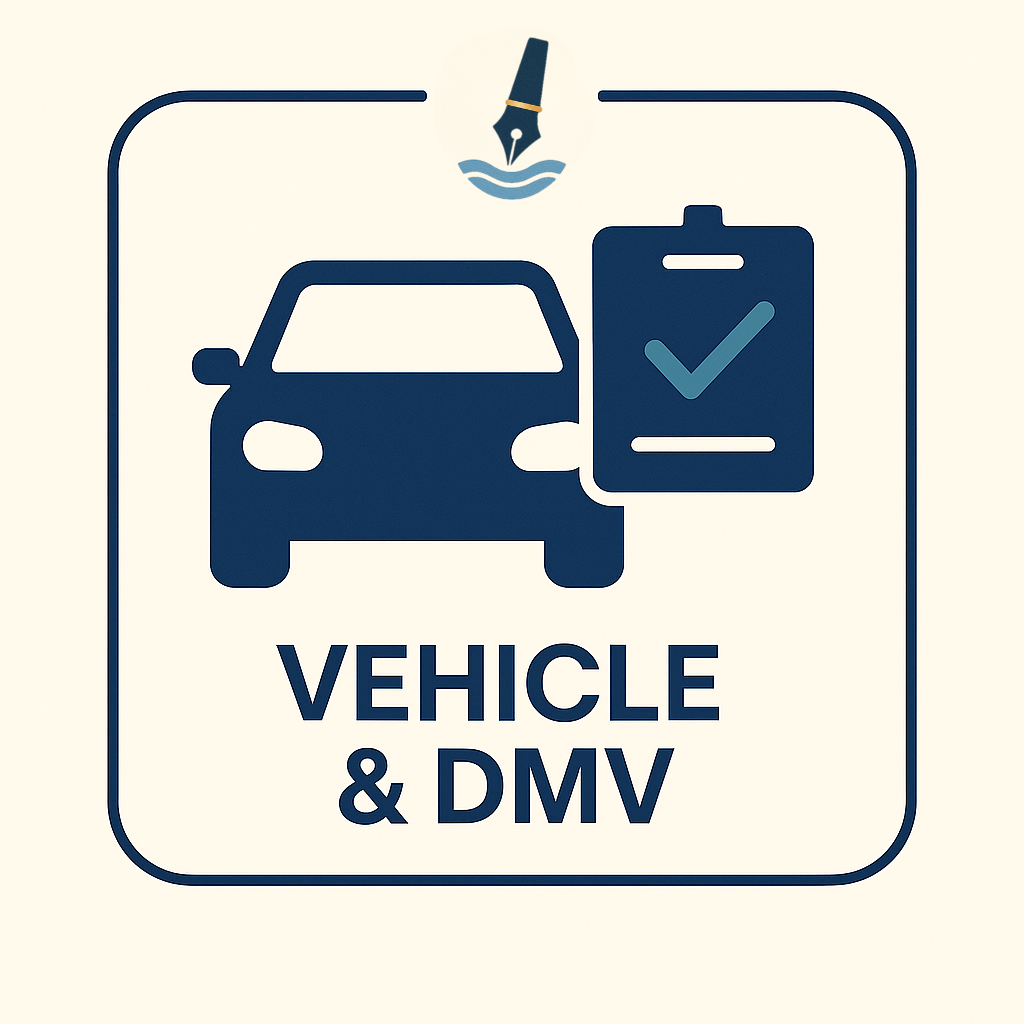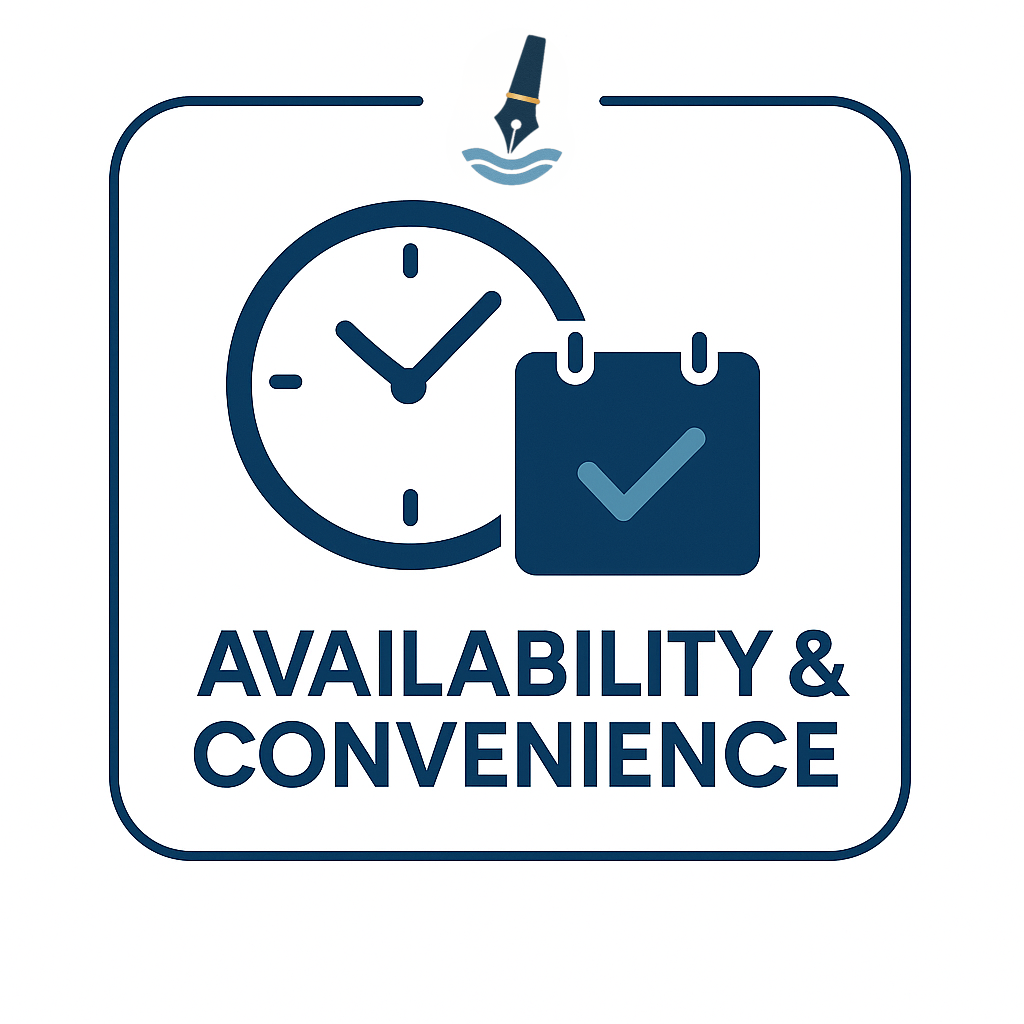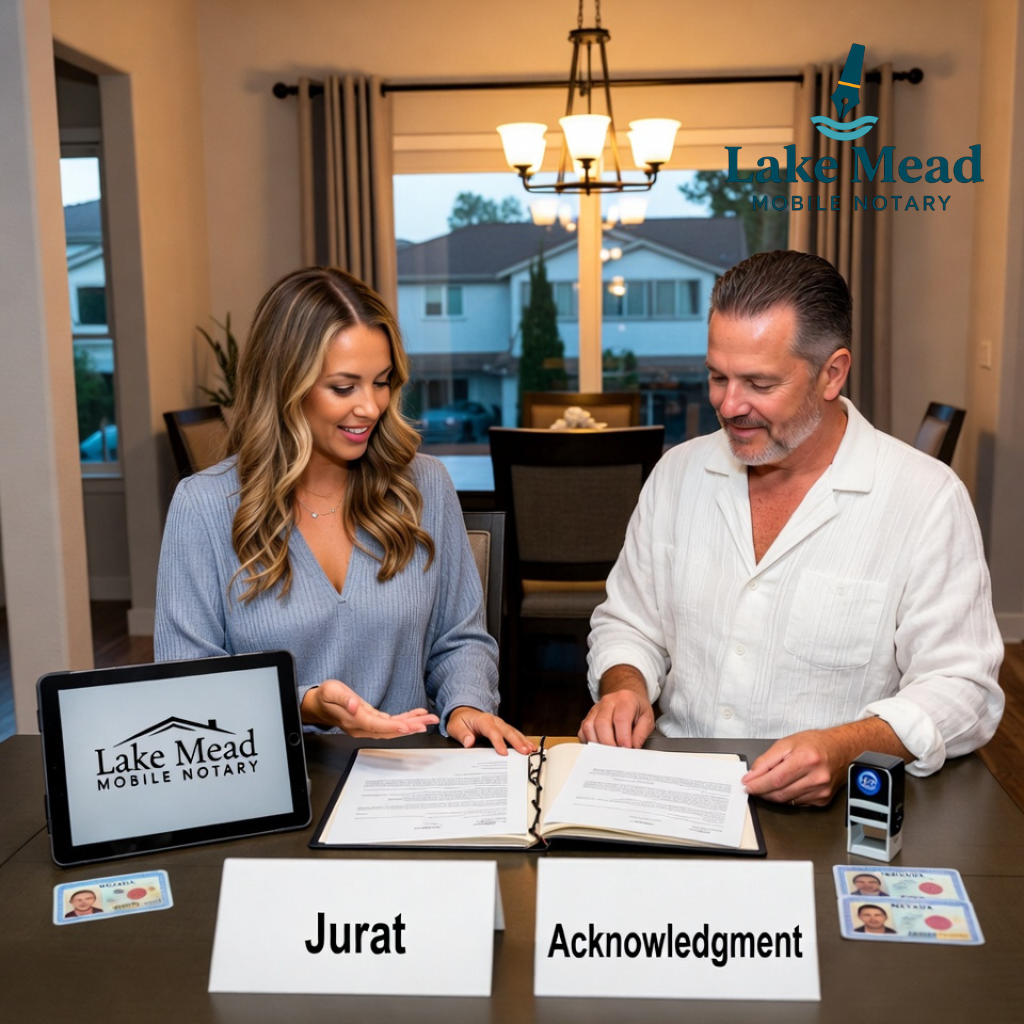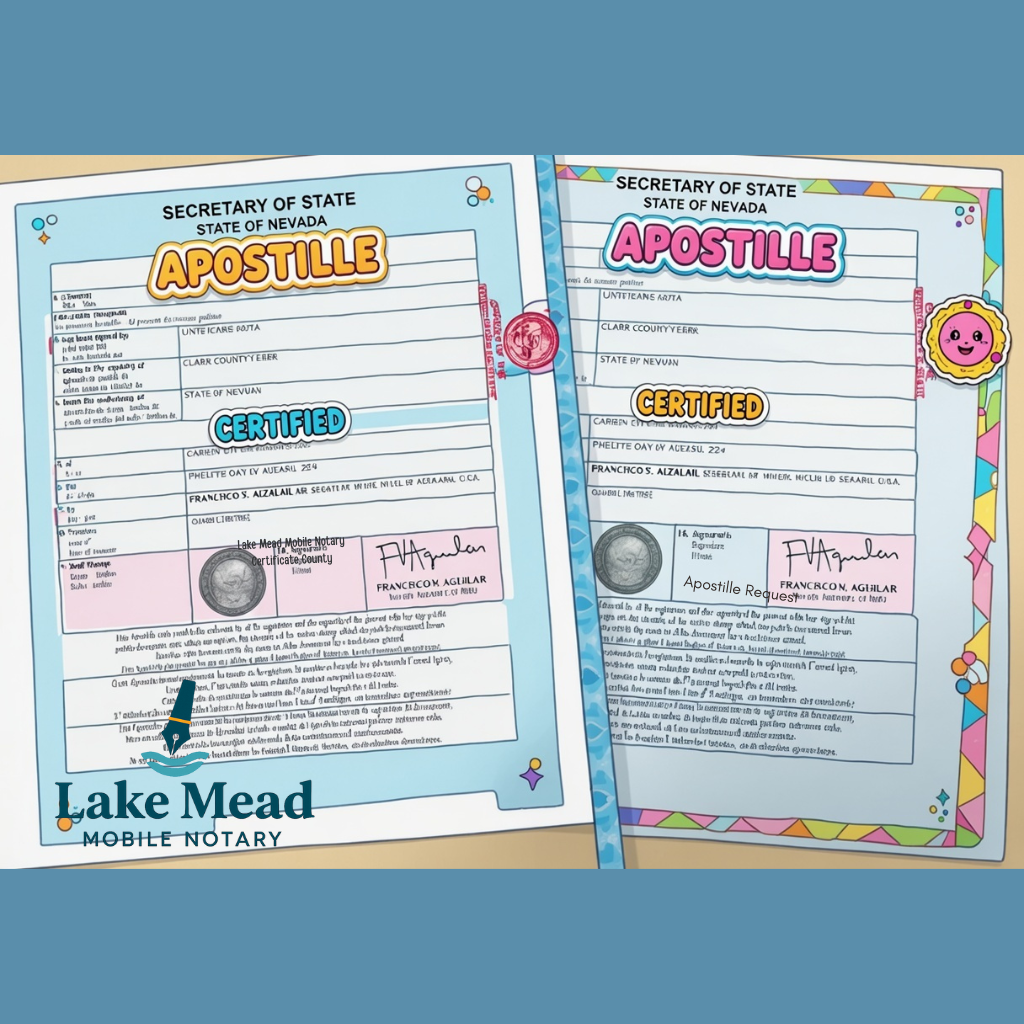Retirement & Pension Notarization in Nevada: Complete 2025 Guide for Beneficiary Changes & Spousal Consent

Lake Mead Mobile Notary provides same-day retirement and pension notarization starting at $45 for retirees, federal employees, married couples, and estate planning professionals throughout Las Vegas, Henderson, and Clark County when Nevada community property laws require spousal consent notarization for 401(k) beneficiary changes, pension distributions, life insurance modifications, and retirement account rollovers. Retirement notarization protects financial planning by establishing proof of signature authenticity and spousal consent acknowledgment for retirement accounts, insurance beneficiary designations, pension authority documents, IRA transfers, and financial powers of attorney. Common retirement notarization needs include spousal waiver forms confirming community property consent, 401(k) rollover notarization for IRA transfers, life insurance beneficiary change notarization when spouse is present or via remote online notarization, pension distribution authorization documents, federal retirement plan forms for PERS/CSRS/TSP beneficiary updates, annuity beneficiary designations, and power of attorney documentation for managing retirement accounts. Licensed Nevada notaries travel directly to senior communities, retirement offices, and residential locations throughout Henderson, Summerlin, Las Vegas, and all Clark County communities to notarize retirement documentation when in-house staff are unavailable, when remote signers require coordination, or when same-day execution is required for account transfers, beneficiary changes, or spousal consent deadlines.
Retirement and pension notarization in Nevada is more complex than most retirees realize, especially for those navigating community property laws that mandate spousal consent. Lake Mead Mobile Notary provides specialized retirement notarization services for retirees, federal employees, pension beneficiaries, and estate planning professionals throughout Henderson, Summerlin, and Las Vegas with licensed Nevada notaries who provide same-day service to senior communities and residential locations when retirement account changes require immediate notarization.
This comprehensive guide covers Nevada community property spousal consent requirements, types of retirement documents requiring notarization, common problems retirees face, 401(k) vs. IRA vs. pension notarization differences, insurance beneficiary change procedures, and how mobile notary services support retirement planning with flexible scheduling and on-site execution at senior communities, retirement homes, and residential locations.
Nevada is a community property state, which fundamentally changes retirement account notarization requirements compared to most other states. Understanding these distinctions prevents costly legal complications and beneficiary designation rejections.
In Nevada (community property state), any significant change to retirement account beneficiary designations requires the spouse's notarized waiver or consent. This is not optional—it's a legal requirement that prevents one spouse from unilaterally changing beneficiaries in ways that disadvantage the community.
Why Community Property Matters:
This is why many Nevada retirees face unexpected delays—they assume changing their own beneficiary is straightforward, then discover their spouse must notarize consent forms.
Federal retirement plans (401(k), 403(b), pension plans) comply with ERISA (Employee Retirement Income Security Act), which requires spousal consent for any beneficiary change that removes the spouse. The spouse must acknowledge this consent in writing, typically notarized.
This applies even if:
ERISA protections remain in place until divorce is finalized and the plan is officially notified.
Beyond Nevada law, individual insurance companies and retirement plan custodians (Fidelity, Charles Schwab, Vanguard, John Hancock, etc.) have their own notarization requirements that often exceed state requirements:
This is why general bank notaries often fail to properly notarize retirement documents—they're unfamiliar with plan-specific requirements.
Common Scenario: "I changed my 401(k) beneficiary from my spouse to my children. The plan required my spouse's notarized consent form. She went to UPS Store, got it notarized, and we submitted it. Three weeks later, the plan rejected it saying 'Notarization does not meet 401(k) plan requirements for community property spousal consent.' Now we're told we have to get it re-notarized with specific language about Nevada community property law and the spouse's understanding of the consequences. This is frustrating and holding up our estate planning."
Why This Happens: General notaries (UPS Store, bank notaries) follow basic notarization procedures but don't understand retirement plan requirements. The spousal consent form needs specific language confirming: (1) Nevada community property implications, (2) spouse's voluntary agreement, (3) spouse's understanding of beneficiary consequence, and (4) plan-specific language.
Solution: Specialized retirement notaries understand 401(k), IRA, pension, and insurance plan-specific requirements. We coordinate with clients to ensure spousal consent notarization includes all required language, preventing rejection and re-notarization delays.
Common Scenario: "I retired from a federal job and manage a TSP (Thrift Savings Plan) account. I wanted to roll it to an IRA with a financial advisor in Arizona where my son lives. The advisor prepared the rollover authorization form and said 'Get it notarized in any state.' I got notarized in Arizona by a notary near my son's house. When we submitted to TSP, they rejected it saying 'Federal retirement plan documents require notarization by a notary in the state where the account holder resides.' I live in Nevada, so I had to get re-notarized by a Nevada notary. This cost me extra fees and delayed my rollover by three weeks."
Why This Happens: Federal retirement plans (CSRS, FERS, TSP, military pensions) have strict requirements that notarization must be performed by a notary in the beneficiary's state of residence. Out-of-state notarizations don't meet federal compliance standards, even if perfectly valid in their original state.
Solution: Nevada retirees managing federal pensions or TSP accounts should ALWAYS use Nevada notarization. Lake Mead Mobile Notary provides same-day service throughout Clark County, ensuring proper state-specific notarization the first time.
Common Scenario: "I wanted to change my life insurance policy's beneficiary from my spouse to a charitable foundation. My insurance company said 'Your spouse must sign and have that signature notarized before we can process this change.' My spouse is in California for her job and won't be back for two months. I didn't want to wait that long, and sending her documents to sign remotely seemed complicated. Meanwhile, my health was declining and I was worried about the policy not reflecting my wishes. I felt trapped."
Why This Happens: Insurance companies require spousal consent for beneficiary changes in community property states. If spouses live separately or are in different states, coordinating notarization becomes complicated. Many retirees don't realize remote online notarization (RON) is an option.
Solution: Mobile notaries coordinate remote online notarization (RON) for out-of-state spouses. The spouse participates via secure video conference while the notary witnesses electronically, completing spousal consent in days rather than months. Same-day coordination is available for urgent situations.
Common Scenario: "I rolled my 401(k) to an IRA at Fidelity. Then I wanted to name a new beneficiary on the IRA. Fidelity said 'You need to provide a notarized form confirming your spouse waives any community property interest.' But my spouse refused to sign anything, claiming 'The IRA is yours personally, not community property.' We got stuck. Fidelity wouldn't process the beneficiary change without spouse's notarized waiver, but my spouse refused to cooperate. Our marriage was rocky and we've since divorced, but at the time this was a major conflict."
Why This Happens: IRAs are technically treated differently than 401(k)s under Nevada law (IRAs may not trigger spousal consent requirements), BUT financial institutions like Fidelity apply stricter requirements as a company policy to protect themselves. This creates confusion when spouses disagree about community property status.
Solution: Before attempting to notarize retirement beneficiary changes, consult with a Nevada estate planning attorney about whether spousal consent is actually required. Mobile notaries can also advise on typical requirements and help connect clients with legal resources. Some situations require legal clarity before notarization can proceed.
Common Scenario: "My mother is 88 and wants to change her annuity beneficiary to my sister (her primary caregiver). We found a notary at a UPS Store, but the notary looked uncomfortable during the process. She asked my mother questions about the change and seemed doubtful about my mother's mental clarity. After 20 minutes, the notary said 'I'm not comfortable notarizing this. I don't believe your mother fully understands the document.' The insurance company wouldn't accept the unsigned form. We were stuck. My mother was perfectly capable of understanding, but the notary's discomfort created a barrier."
Why This Happens: Notaries are legally responsible for confirming the signer is mentally competent and understanding the document. With elderly signers, notaries sometimes become overly cautious, fearing liability if the document is later challenged as signed under undue influence or diminished capacity. This well-intentioned protection can prevent legitimate transactions.
Solution: Mobile notaries experienced in senior documentation understand mental competency assessment. We coordinate with family members, gather supporting documentation (medical records, recent correspondence showing clear thinking), and help seniors explain their decisions in their own words. Experienced notaries rarely have the hesitation that general notaries display, enabling seniors to complete legitimate beneficiary changes efficiently.
This is the most confusing aspect of retirement notarization for Nevada residents. The rules differ significantly depending on the account type, and even financial institutions sometimes apply inconsistent standards.
Spousal consent REQUIRED under federal law (ERISA § 4.504.3). Spouse must consent in writing to any beneficiary change that removes the spouse as beneficiary. This consent must be notarized. Nevada community property law reinforces this federal requirement.
Spousal consent NOT required under federal law (IRAs are not ERISA-covered). However, Nevada community property law creates ambiguity, and financial institutions often apply their own stricter policies.
Recommendation: Before assuming no spousal consent is required, contact your IRA custodian directly. Better safe than sorry—unnecessary re-notarization is frustrating.
Spousal consent REQUIRED under federal law (and Nevada law reinforces). Spouse must consent to any beneficiary change that removes survivor benefits.
Varies by insurance company policy (some require spousal consent, others don't). Always contact your insurance company BEFORE notarizing.
Prevented Delays & Rejections:
Spousal Coordination Efficiency:
Out-of-State Spouse Coordination:
Annual Retirement Planning ROI:
Lake Mead Mobile Notary provides retirement notarization services throughout Las Vegas Valley with specialized service to senior communities, retirement homes, and residential locations where retirees live.
It depends on the account type. 401(k)s, pensions, and most federal retirement plans (CSRS, FERS, TSP) require spousal consent notarization. IRAs and insurance products vary by custodian/company. Nevada's community property status reinforces many of these requirements. Always check with your plan custodian or insurance company before assuming no spousal consent is needed.
Yes. Legally, spouses cannot be forced to sign beneficiary waivers. If spouses disagree about retirement beneficiary changes, legal resolution may be required. This sometimes involves family mediation or estate planning attorney intervention. Don't attempt to notarize against spouse's will—it creates legal invalidity and relationship damage.
Contact the plan/insurance company and ask why it was rejected. Common reasons: (1) improper notarization language, (2) out-of-state notary when state-specific notary required, (3) mental competency concerns, (4) signature legibility problems. Once identified, you'll need complete re-notarization. Specialized retirement notaries prevent rejections by confirming all requirements before notarizing.
Yes, if your plan/insurance company accepts it (check their requirements). Remote online notarization (RON) is particularly useful when spouses live in different states. The signer verifies identity via video conference with a notary who witnesses electronically. This is becoming more common but not yet universal—always confirm your custodian accepts RON.
Lake Mead Mobile Notary provides same-day service with typical 2-4 hour appointments available. For emergencies or urgent deadline situations, we offer rush appointments with 1-2 hour response times (premium fees apply). We can coordinate with both spouses simultaneously to complete spousal consent notarization in a single appointment.
✍️ Power of Attorney Notarization
Durable and limited power of attorney documents for managing retirement accounts and financial assets.
📋 Affidavit Notarization
Sworn statements and affidavits for retirement account changes, spousal consent, and marital status verification.
📊 Loan Document Notarization
Financial and retirement account documentation notarization.
📝 Bill of Sale Notarization
Asset transfer documentation including retirement portfolio transfers.
🌙 After-Hours Notary Service
Evening, weekend, and emergency notarization for retirement documents with urgent deadlines.













